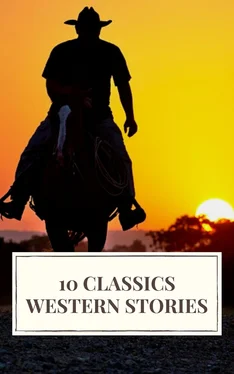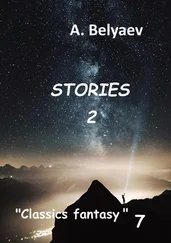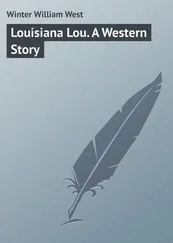It was, in effect, this:—
A large canoe, with great white wings like a bird, had come gliding over the waters to the coast near the mouth of the Wauna. Whence it came no one could tell; but its crew were pale of skin like the great white shaman there in the council, and seemed of his race. Some of them came ashore in a small canoe to trade with the Indians, but trouble rose between them and there was a battle. The strangers slew many Indians with their magic, darting fire at them from long black tubes. Then they escaped to the great canoe, which spread its wings and passed away from sight into the sea. Many of the Indians were killed, but none of the pale-faced intruders. Now the band who had suffered demanded that the white man of whom they had heard—the white chief at the council—be put to death to pay the blood-debt.
All eyes turned on Cecil, and he felt that his hour was come. Weak, exhausted in body and mind, wearied almost to death, a sudden and awful peril was on him. For a moment his heart sank, his brain grew dizzy. How could he meet this emergency? All his soul went out to God with a dumb prayer for help, with an overwhelming sense of weakness. Then he heard Multnomah speaking to him in cold, hard tones.
“The white man has heard the words of the runner. What has he to say why his life should not pay the blood-debt?”
Cecil rose to his feet. With one last effort he put Wallulah, himself, his mission, into the hands of God; with one last effort he forced himself to speak.
Men of nervous temperament, like Cecil, can bring out of an exhausted body an energy, an outburst of final and intense effort, of which those of stronger physique do not seem capable. But it drains the remaining vital forces, and the reaction is terrible. Was it this flaming-up of the almost burned-out embers of life that animated Cecil now? Or was it the Divine Strength coming to him in answer to prayer? Be this as it may, when he opened his lips to speak, all the power of his consecration came back; physical weakness and mental anxiety left him; he felt that Wallulah was safe in the arms of the Infinite Compassion; he felt his love for the Indians, his deep yearning to help them, to bring them to God, rekindling within him; and never had he been more grandly the Apostle to the Indians than now.
In passionate tenderness, in burning appeal, in living force and power of delivery, it was the supreme effort of his life. He did not plead for himself; he ignored, put aside, forgot his own personal danger; but he set before his hearers the wickedness of their own system of retaliation and revenge; he showed them how it overshadowed their lives and lay like a deadening weight on their better natures. The horror, the cruelty, the brute animalism of the blood-thirst, the war-lust, was set over against the love and forgiveness to which the Great Spirit called them.
The hearts of the Indians were shaken within them. The barbarism which was the outcome of centuries of strife and revenge, the dark and cumulative growth of ages, was stirred to its core by the strong and tender eloquence of this one man. As he spoke, there came to all those swarthy listeners, in dim beauty, a glimpse of a better life; there came to them a moment’s fleeting revelation of something above their own vindictiveness and ferocity. That vague longing, that indefinable wistfulness which he had so often seen on the faces of his savage audiences was on nearly every face when he closed.
As he took his seat, the tide of inspiration went from him, and a deadly faintness came over him. It seemed as if in that awful reaction the last spark of vitality was dying out; but somehow, through it all, he felt at peace with God and man. A great quiet was upon him; he was anxious for nothing, he cared for nothing, he simply rested as on the living presence of the Father.
Upon the sweet and lingering spell of his closing words came Multnomah’s tones in stern contrast.
“What is the word of the council? Shall the white man live or die?”
Snoqualmie was on his feet in an instant.
“Blood for blood. Let the white man die at the torture-stake.”
One by one the chiefs gave their voice for death. Shaken for but a moment, the ancient inherited barbarism which was their very life reasserted itself, and they could decide no other way. One, two, three of the sachems gave no answer, but sat in silence. They were men whose hearts had been touched before by Cecil, and who were already desiring the better life They could not condemn their teacher.
At length it came to Tohomish. He arose. His face, always repulsive, was pallid now in the extreme. The swathed corpses on mimaluse island looked not more sunken and ghastly.
He essayed to speak; thrice the words faltered on his lips; and when at last he spoke, it was in a weary, lifeless way. His tones startled the audience like an electric shock. The marvellous power and sweetness were gone from his voice; its accents were discordant, uncertain. Could the death’s head before them be that of Tohomish? Could those harsh and broken tones be those of the Pine Voice? He seemed like a man whose animal life still survived, but whose soul was dead.
What he said at first had no relation to the matter before the council. Every Indian had his tomanowos appointed him by the Great Spirit from his birth, and that tomanowos was the strength of his life. Its influence grew with his growth; the roots of his being were fed in it; it imparted its characteristics to him. But the name and nature of his tomanowos was the one secret that must go with him to the grave. If it was told, the charm was lost and the tomanowos deserted him.
Tohomish’s tomanowos was the Bridge and the foreknowledge of its fall: a black secret that had darkened his whole life, and imparted the strange and mournful mystery to his eloquence. Now that the Bridge was fallen, the strength was gone from Tohomish’s heart, the music from his words.
“Tohomish has no voice now,” he continued; “he is as one dead. He desires to say only this, then his words shall be heard no more among men. The fall of the Bridge is a sign that not only the Willamettes but all the tribes of the Wauna shall fall and pass away. Another people shall take our place, another race shall reign in our stead, and the Indian shall be forgotten, or remembered only as a dim memory of the past.
“And who are they who bring us our doom? Look on the face of the white wanderer there; listen to the story of your brethren slain at the sea-coast by the white men in the canoe, and you will know. They come; they that are stronger, and push us out into the dark. The white wanderer talks of peace; but the Great Spirit has put death between the Indian and the white man, and where he has put death there can be no peace.
“Slay the white man as the white race will slay your children in the time that is to come. Peace? love? There can be only war and hate. Striking back blow for blow like a wounded rattlesnake, shall the red man pass; and when the bones of the last Indian of the Wauna lie bleaching on the prairie far from the mimaluse island of his fathers, then there will be peace.
“Tohomish has spoken; his words are ended, and ended forever.”
The harsh, disjointed tones ceased. All eyes fell again on Cecil, the representative of the race by which the Willamettes were doomed. The wrath of all those hundreds, the vengeance of all those gathered tribes of the Wauna, the hatred of the whole people he had come to save, seemed to rise up and fall upon him the frail invalid with the sharp pain throbbing at his heart.
But that strange peace was on him still, and his eyes, dilated and brilliant in the extremity of physical pain, met those lowering brows with a look of exceeding pity.
Читать дальше












